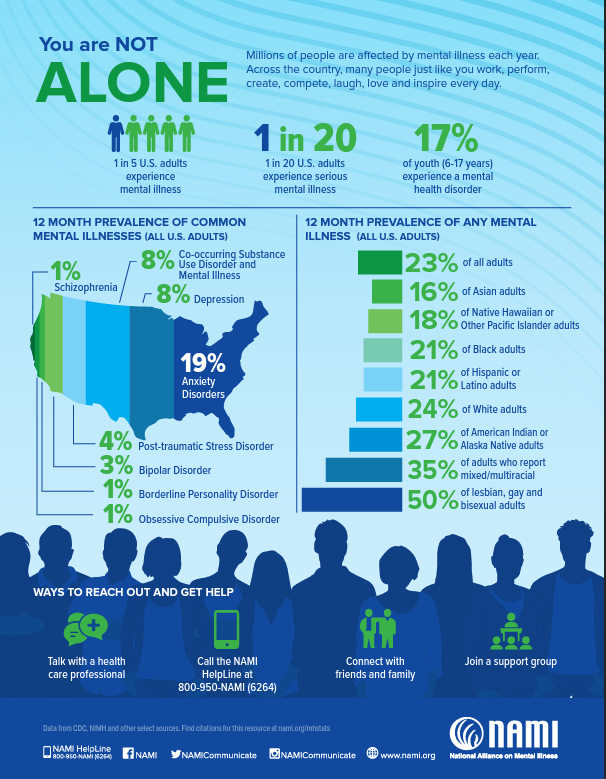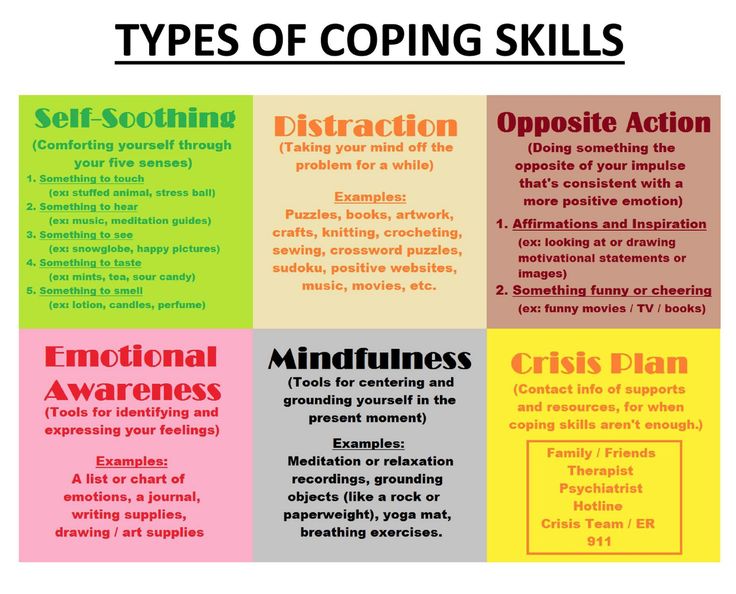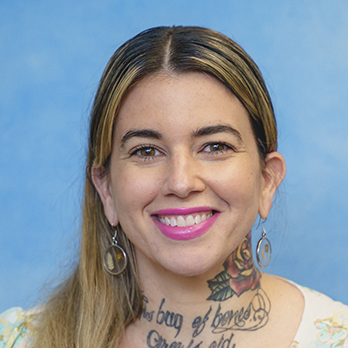Let’s End the Stigma

Let’s End the Stigma
Since 1949, May has been observed as Mental Health Awareness Month. It was established to bring awareness to the importance of mental well-being. According to National Alliance on Mental Illness, 1 in 5 U.S. adults will experience mental illness at some point in their life. Even if you do not fall into this statistic, each and every one of us will experience challenges that impact our mental health.
What is mental illness?
- A mental illness is a medical condition that disrupts a person’s thinking, feeling, mood, and ability to relate to others and daily functioning.
- Mental illnesses include: Major depression, schizophrenia, bipolar disorder, obsessive-compulsive disorder, panic disorder, posttraumatic stress disorder, and borderline personality disorder.
- Specific mental disorders include: Anxiety disorders, ADD/ADHD, dissociative disorders, eating disorders, and substance use disorders.
- Mental illnesses can affect persons of ANY age, race, religion, or income. Mental illnesses are NOT the result of personal weakness, lack of character, or poor upbringing.

Some statistics on suicide:
- An estimated 703,000 people die by suicide worldwide each year.
- The global suicide rate is more than two times as high among men than women.
- In 2020, there were an estimated 1.20 million suicide attempts.
- Suicide remains illegal in over 20 countries, while people who engage in suicidal behavior may be punished in some countries that follow Sharia law, involving legal penalties that range from a small fine or short prison sentence to life imprisonment, according to the World Health Organization.
These are staggering numbers and inhumane ways of confronting someone living with a mental illness. Let’s work to fight the stigma and shine a light on mental health disorders. Early intervention is important and recovery is possible!
What is stigma?
According to Oxford Languages, stigma is a mark of disgrace with a particular circumstance, quality, or person. Stigma and discrimination can contribute to worsening symptoms and reduce the likelihood of getting treatment. Effects can include: Reduced hope, lower self-esteem, lower self-worth, increased psychiatric symptoms, and difficulty with relationships.
How to combat stigma:
- Talk openly: This can make others feel less alone.
- Education: Research something you don’t fully understand.
- Be conscious of your language: “Just be happy.” “You look fine to me.” ”Someone has it worse than you, you should be grateful.” Language like this is toxic positivity and can perpetuate stigma.
- Person first language: “Someone living with a mental health condition” instead of “She’s bipolar.”
- Reiterate that mental illness is a medical condition: You wouldn’t wait to get treatment if you had a broken leg!
- Speak up when you see someone using stigmatizing language, or stereotyping a group.
- Practice compassion and empathy.
Start the conversation
- Ask questions and show you are actively listening: Instead of, “What’s wrong with you?” change the narrative to: “What happened?”
- “I’ve noticed that:” Recognize and acknowledge a person may be acting/behaving differently than they normally do. Express genuine concern.
- Remind the person that they are not alone.
- Encourage professional supports.
- Encourage self-help: Ask the person what they enjoy doing, something that brings them joy or purpose. Ask if they would like you to join in with them for support.
- Express kindness and empathy towards the person’s feelings and emotions “I care about you.”
- Be aware of potential triggers.
- Share resources.
- “Are you thinking about suicide?” By asking the question directly this can decrease the stigma surrounding this topic.
Recovery is possible!
With proper treatment, 70% to 90% of people with mental illnesses will experience a significant reduction of symptoms and enjoy an improved quality of life, according to dosomething.org.
Coping skills and individualized treatment can significantly benefit someone living with a mental illness, but remember there is not a one-size fits all approach.

Image from: Pembroke Public Schools
Mindful Journaling
Mindful or meditative journaling is a focused writing process to help concentrate on the current state of our thoughts, feelings, emotions, and actions. Mindful journaling is a process of writing about experiences in an honest, nonjudgmental way. Your journaling sessions can teach you how to live life fully and deeply and gain insight into yourself. It is a simple yet profound technique used to improve our mental and emotional well-being.
Mindful Journaling Prompts:
- What is the strongest feeling I am experiencing right now?
- Is there any part of my body that feels unusually tight, tense, or sore? What feelings arise from this discomfort?
- What story am I telling myself right now? Is this story helpful and true? If not, how can I rewrite it?
- What am I most grateful for today? How can I express this gratitude?
- Was there a difficult thought or emotion that came up for me today? How can I respond to this?
- What was the most important thing I accomplished or made progress on today?
- What did I learn or discover today? What made me feel alive and fulfilled?
- Finish the sentence…Pain feels like ________.
- What would you tell your younger self today?
Prompts from Yoga Basics (2000) 19 Mindful journal prompts for deeper self-reflection
Retrieved from https://www.yogabasics.com/connect/yoga-blog/mindful-journal-prompts/
Remember to always be patient with yourself. Some days it will be small steps towards progress, others more significant. We are always doing the best we can. Spread love to yourself and others.
Quote of The Month:
“Today if you do nothing else at all, at least take a moment to stand tall. Take a deep breath. Put your hand on your chest. Feel your heartbeat. Feel the air move through your lungs. You are beautifully alive. You are needed here so much.”
– Jennae Cecelia, Poet
Thank you,


Allison LaRussa, B.A., CPS, RYT
Director, Health Humanities
The Wright Centers for Community Health and Graduate Medical Education








